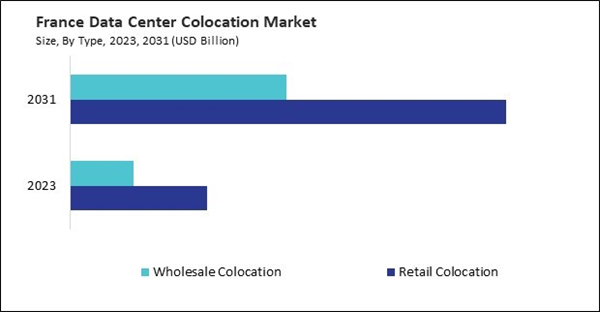The Germany market dominated the Europe Data Center Colocation Market by country in 2023, and is expected to continue to be a dominant market till 2031; thereby, achieving a market value of $10.94 billion by 2031. The UK market is exhibiting a CAGR of 14.2% during 2024-2031. Additionally, the France market is expected to experience a CAGR of 16.2% during 2024-2031.
Data center colocation services are widely used across industries for various applications, from cloud hosting and big data processing to disaster recovery and business continuity planning. Large enterprises and hyper-scale cloud providers rely on colocation to support their high-performance computing needs. At the same time, small and medium-sized businesses (SMEs) leverage colocation to enhance IT agility, reduce operational costs, and ensure regulatory compliance.
One of the most common colocation applications is in the financial services sector, where organizations require low-latency data processing and secure transaction management. Banks, investment firms, and fintech companies use colocation to store and process massive volumes of financial data while ensuring compliance with regulatory standards such as GDPR, PCI-DSS, and ISO 27001. Similarly, the healthcare industry depends on colocation for secure patient data storage, AI-driven diagnostics, and research analytics. With the increasing adoption of electronic health records (EHR) and telemedicine, colocation data centers are vital in ensuring data privacy, HIPAA compliance, and real-time data access for medical institutions.
The continuous expansion of ICT manufacturing further strengthens the need for data center colocation. The production of advanced computing hardware, IoT devices, and network infrastructure is increasing the volume of data generated within the region. With businesses seeking to scale their digital capabilities, colocation services offer a strategic advantage by providing high-performance computing environments without heavy capital investment in proprietary data centers. In conclusion, as the EU remains focused on strengthening its digital economy, investments in data center colocation are expected to rise, ensuring the region’s ICT sector continues its upward trajectory.
List of Key Companies Profiled
- Rackspace Technology, Inc.
- Equinix, Inc.
- NTT Data Corporation
- Cyxtera Technologies, Inc. (BC Partners and Medina Capital)
- Iron Mountain, Inc.
- QTS Realty Trust, Inc.
- Cologix, Inc.
- China Telecom Corporation Limited
- CyrusOne LLC
- Zayo Group Holdings, Inc.
Market Report Segmentation
By Type
- Retail Colocation
- Wholesale Colocation
By Enterprise Size
- Large Enterprises
- SMEs
By Tier Level
- Tier 3
- Tier 4
- Tier 1
- Tier 2
By End Use
- IT & Telecom
- Healthcare
- Media & Entertainment
- BFSI
- Retail
- Other End Use
By Country
- Germany
- UK
- France
- Russia
- Spain
- Italy
- Rest of Europe
Table of Contents
Companies Mentioned
- Rackspace Technology, Inc.
- Equinix, Inc.
- NTT Data Corporation
- Cyxtera Technologies, Inc. (BC Partners and Medina Capital)
- Iron Mountain, Inc.
- QTS Realty Trust, Inc.
- Cologix, Inc.
- China Telecom Corporation Limited
- CyrusOne LLC
- Zayo Group Holdings, Inc.









